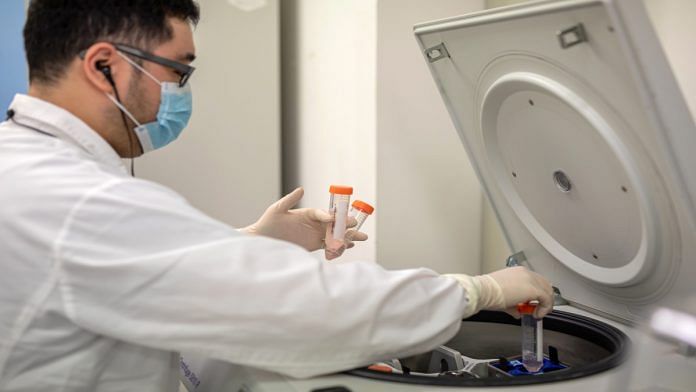
New Delhi: The novel coronavirus pandemic has claimed more than 53,000 lives globally. Researchers across the world are now in a race to understand this new virus and find a cure for Covid-19 illness.
ThePrint brings you the top five research developments on Covid-19 from across the globe.
Malaria drug with azithromycin may raise risk of heart problems
Cardiologists have warned that a combination of hydroxychloroquine (anti-malaria drug) and azithromycin — which is being used to treat coronavirus in many countries, including India — can increase the risk for abnormal heart rhythms.
There are hundreds of drugs that can increase the risk of a cardiac arrest, but using these two medicines together in patients who are already at risk or critically ill could particularly raise that risk further, said experts.
]There is still very little data regarding hydroxychloroquine and azithromycin’s effectiveness as a treatment for Covid-19, the researchers added. Until there is some clinical outcome data supporting the benefits or harm of these medications, doctors should use caution in using the combination.
Also read: Social stigma towards mental health should not bother you in lockdown. Solution’s online
Trial drug may help treat Covid-19
An experimental drug, APN01, tested against lung disease could potentially inhibit Covid-19 by reducing coronavirus load entering the organ.
A study, published in the journal Cell, conducted in human cell cultures and organoids has shown that the drug could be promising for treatment of Covid-19 patients in their early stages of infection.
According to researchers at the Karolinska Institutet in Sweden and the University of British Columbia (UBC) in Canada, APN01 has already been tested against lung disease in a clinical phase II study.
Biotech company Aperion Biologics, which has been developing APN01 with the active substance, is planning to conduct a clinical pilot study on infected Covid-19 patients in China.
AI system can predict patients needing ventilators
Scientists at the University of Copenhagen are developing an artificial intelligence system that can predict if a patient suffering from Covid-19 will need a ventilator or intensive care.
With this system, hospitals will be able to know what percentage of their patients shall require a ventilator within one week, allowing them to plan and deploy their resources in the best possible way.
The system can also help scientists identify patterns from patient data and help them understand why some of the younger Covid-19 patients need ventilators, while some older people recover without needing one.
Also read: Airbnb may become obsolete depending on recovery of tourism after Covid-19 crisis
App to help panic attacks during pandemic
An app called PanicMechanic, developed by researchers at the University of Vermont, may help people who suffer from panic attacks manage their anxiety.
The app, meant to be used as a supplement to professional clinical care, uses the camera on cell phones to measure a body’s panic response. It is based on decades of research showing that enabling panic sufferers to observe their body’s reaction to stress reduces panic.
The app is effective because it gives a sufferer something to do during an episode of attack, researchers said. The PanicMechanic, which is available at the Apple App store, uses machine learning to predict how long a panic attack will last, based on past records.
Researchers share design of 3D-printed face shields
Researchers at McGill University have developed 3D-printed face shields to protect healthcare workers treating Covid-19 patients.
Partnering with Montreal-based 3D printing company AON3D, the team has donated hundreds of units to four hospitals in Montreal. They have plans to deliver 10,000 more in the coming week.
The face shields are specially designed for the needs of medical staff during high-risk procedures such as intubations, while still providing them with the mobility and visibility required to do their jobs.
The design files have been made openly available and can be used by anyone with 3D printers to develop these masks.
Also read: No new Covid-19 case in 4 days, Bhilwara could offer lessons in fight against pandemic

COMMENTS